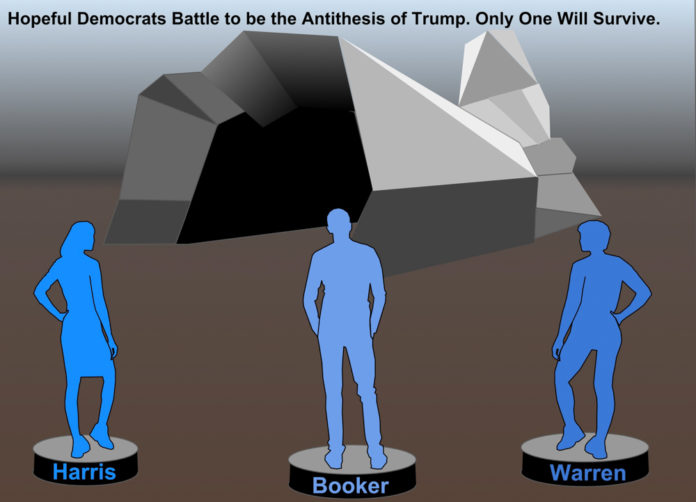Barring a nomination of the Antichrist, I am likely to vote for whoever the Democratic Party puts up for the general election in 2020. And it’s not just me — a recent PBS poll reported that 57 percent of voters, and 91 percent of Democrats, say they will definitively vote against Donald Trump when the time comes.
I’m frustrated by this. I feel captive to the whims of the Democratic Party, practically falling over myself to vote for someone that I may strongly disagree with in order to stop someone I loathe.
But ultimately, it doesn’t matter who I want the Democrats to nominate. Because whoever that may be, the election won’t be about them. It will be about Trump.
Trump touches everything — tragically, his influence is inescapable. He thrives on attention, and we’ve given it to him. In the 2016 election, Trump benefited from $1,898,000,000 worth of earned (read: free) media. He paid for roughly $10,000,000 worth. In contrast, Clinton’s paid media cost was three times as high, while she received less than half of the earned media that Trump did.
There is nothing to indicate that 2020 will be any different. The PBS poll shows that over half of voters view 2020 as a referendum on Trump: a simple “for” or “against” vote, Brexit-style. This dichotomy has created a fractured, varied and opportunistic field of Democrat candidates — 10, at the time of writing — whose only uniting characteristic is not ideological but practical. Seemingly, they’ve all made the calculation that they should be nominated as the “anti-Trump.”
What we have then is a wide variety of potential anti-Trump manifestations: democratic socialists like Bernie Sanders, centrists like Joe Biden, those somewhere in between like Cory Booker, Elizabeth Warren and Kamala Harris. For a second there was even Richard Ojeda, a converted Trump voter who is pro-coal and pro-weed, and there’s still Tulsi Gabbard, who believes, inconceivably, that her decade campaigning against LGBTQIAP+ rights shouldn’t preclude her from the nomination of the party that legalized same-sex marriage. So if it feels like the Democratic party has no ideological identity, it’s because it doesn’t.
Understandably, the Democratic Party’s fragility combined with the momentous importance of the 2020 election has led some voters to panic. There’s an urgency, many feel, to resolve this identity crisis before 2020 rolls around, to find and nominate the perfect anti-Trump before it’s too late. This has led the Democratic field to cannibalize itself. Every day there’s a new article bashing a Democratic candidate: Kamala Harris isn’t the progressive prosecutor she claims to be, Cory Booker has ties to Wall Street money, Bernie Sanders allowed sexual harassment among his 2016 campaign staffers.
All these things may very well be true, and they warrant criticism and real discussion. But I must wonder, again, if these accusations are tinted differently because of the Trump era. I believe these accusations to be concerned less with the candidates’ own ideology or character, and more with a fear that such controversies will play into Trump’s hands, simultaneously undermining the purity of the Democratic Party’s position as the moral superior. This is perhaps exemplified best by FiveThirtyEight’s analysis of Kristen Gillibrand’s chances:
“On the one hand, Gillibrand has … opposed Trump more often than any other Democrat in the upper chamber. On the other hand, she once took relatively conservative stances on gun control, immigration and other issues … On the one hand, she uses leftist and feminist terms such as “intersectional” … On the other hand, she has ties to Wall Street.”
On the one hand, even the most anti-Trump congresswoman is not the perfect anti-Trump. On the other hand, this is exactly the point.
This is why the Democratic Party will not develop a coherent identity until Trump is out of office. No candidate will have the chance to express themselves independent of Trump’s policies or character. They will be asked to respond to him, to present themselves as his opposite. Any candidate in the Democratic field could posture as such, though none will do so perfectly. That’s where the nightmare scenario comes in: that liberal voters, in pursuit of a scandal-free candidate and a perfect ideological platform that will not present itself, will hand Trump his reelection.
Liberals who hope to shape the identity of the Democratic Party should instead focus on the legislature. In the midterms, that’s where important battles between progressives and centrists played out, in races centered on policy differences and not enemy-of-my-enemy-is-my-friend politics. We have seen the power of Congress to shape the President’s actions. A Republican Congress all but halted Obama in his final two years in office, and Trump’s presidential agenda has stagnated since the House majority change in 2018. If someone like Kamala Harris ascends to the White House in 2020, it is foreseeable that more liberal Congressional representatives (i.e., the Alexandria Ocasio-Cortezes and the Rashida Tlaibs) could hold the real policy power and push Harris (or other centrists) further to the left than what she achieved as a prosecutor and a senator.
I’m not calling for unity among the wide spectrum of voters to Trump’s left. I’m calling for a tactical voting plan that rejects Trump’s regressive policies in favor of a better alternative, followed up with the political work at the local level that will push the new occupant of the White House toward more progressive policies. This is how our government is designed to work, and we shouldn’t forget that.
Zach Goodwin is a sophomore Diplomacy and World Affairs major. He can be reached at zgoodwin@oxy.edu.
![]()































